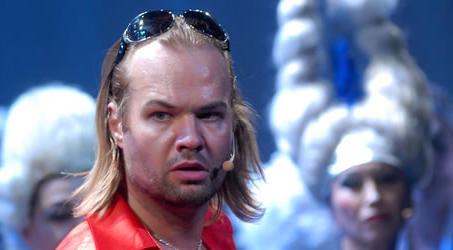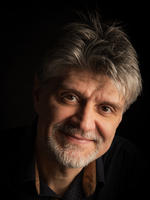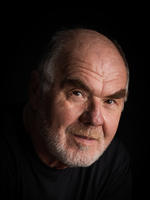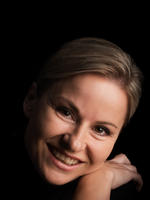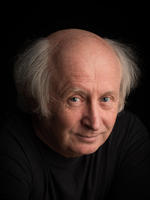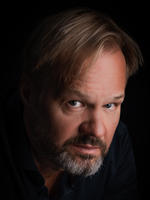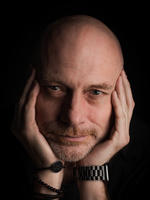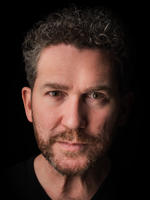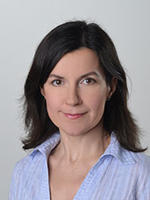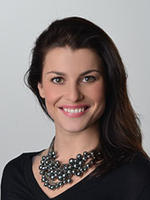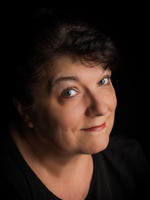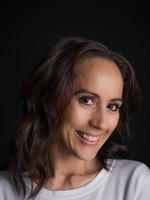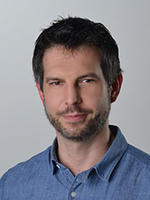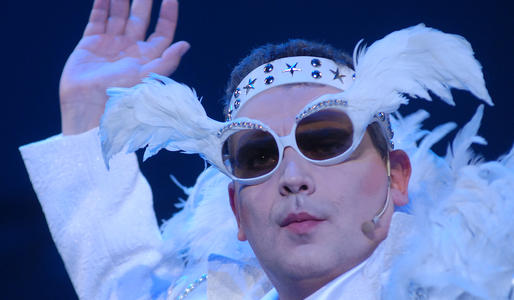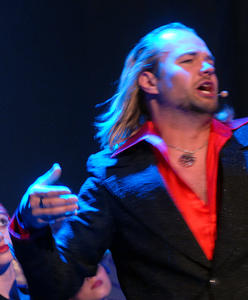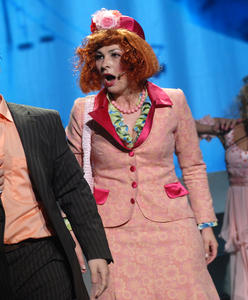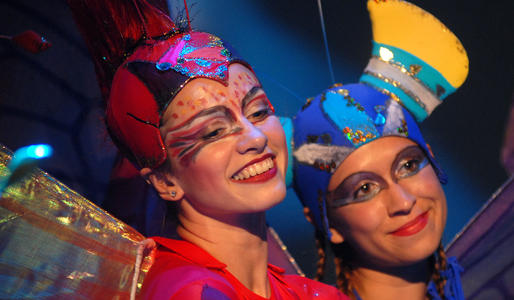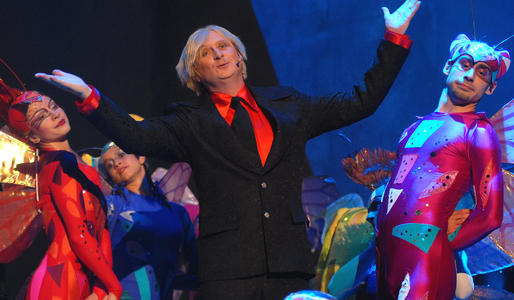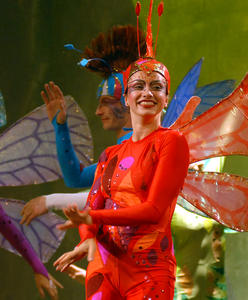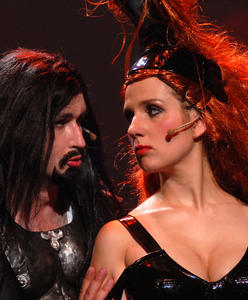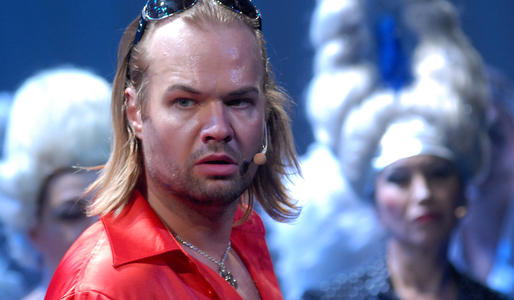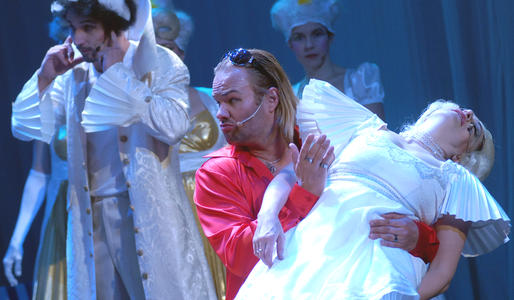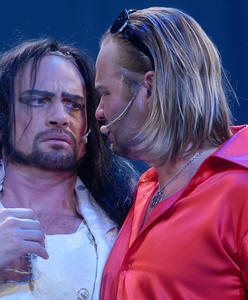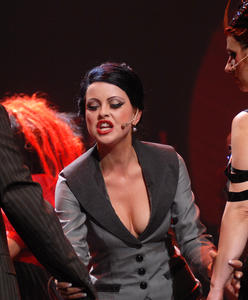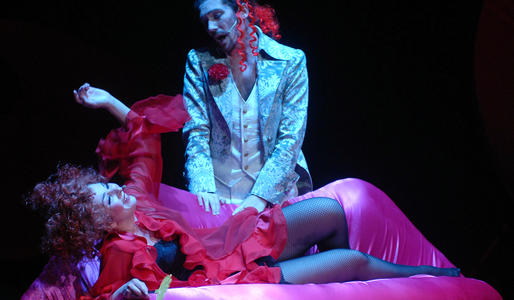Crazy Piece á la Offenbach
Josef Herman 5. September 2006 zdroj Divadelní noviny
The third operetta premiere of the Brno operetta ensemble, after being transferred from the Brno National Theatre to the Brno City Theatre, indicated definitively how the operetta interpreted by Moša’s theatre could look like. They did not come up with anything completely new, they just dressed Offenbach’s Orpheus in the Underworld in a revue-like coat, which is not very usual in this country as traditional operetta productions often try to be faithful to the original work and his author with a greater piety than traditional opera productions, and when naive operetta stories are played with Hamlet’s seriousness, it is unbearable. It is said that “our spectator” does not want it otherwise, but I think that the spectator is willing to suffer everything from weak voices to stage naivisms expired dozens of years just to hear his/her favourite melodies.
The production coped even with weak voices – by using microports. It is necessary because the orchestra must also be sounded at the Music Scene of the Brno City Theatre. Nevertheless, the reproduced sound does not agree with Offenbach’s music, no matter how excellent was the work of conductor Jiří Petrdlík. And when the microports strengthen the weak voices, they also stress possible technical, intonation and pronunciation errors. This also refers to Oľga Bezačinská acting Eurydice, but she was a different woman in contrast to her up-to-now creations in the Ostrava Opera where she is engaged – no dignified standing now and there, no graceful signs and doleful smiles, but a temperament, obstinate beauty, unmanageable by thundering Jupiter himself, much less by wistful Orpheus.
The other operetta singers also stepped over the shade of traditional operetta and matched with the style of the Brno City Theatre with their enthusiasm and expression. However, there is a difference between musical singers, such as Igor Ondříček or Petr Gazdík, and operetta singers. Both levels are coped best with gentility by Miloslav Čížek, but it was not significant this time. The magic change of the ensemble was caused by Gustav Skála who transformed the operetta into a dancing revue as a director and choreographer and by his wittily updated translation of libretto. High speed, exaggeration, gags, crazy ideas of crazy comedy, far distant from the stiffness with which operetta tries in vain to preserve artistic dignity. By the way, the revue form agrees with the varied mixture of vaudevilles, arias and ensembles with which Offenbach made fun of the antique myth, sacred opera theme and French situation of his time. Political hints could not miss here, either. Unfortunately, there is always what to peg at. Antique costumes are mixed with modern fashion, lighting corresponds to rock opera productions and the stage evokes intentionally television revues. Erotic is not missing, but not the stiff operetta-like one. For example Jupiter (Igor Ondříček) turned into a grotesque fly can lay Euridice quickly down on a sofa copied from the TV programme Feather with buffoonish exaggeration. By the way, there is also fun in the Feather finally, but unwished.
I do not think this is the only way of saving operetta. In spite of its indisputable good reasons, using of microphones for such music is considerably debatable. However, people on the stage and in the auditorium had a good time and it could not be seen how much hard work the viewy theatre required. Solid production.
Orpheus in Brno: Ondříček Is the God
Jan Šmikmátor 23. June 2006 zdroj Rovnost
Last week it was as if a bag with last premieres tore. That is why, this week the third dramatic gloss has appeared in the Rovnost paper. This one concerns the Brno City Theatre and its performance Orpheus in the Underworld.
Stage-manager Gustav Skála built a monument to the famous Offenbach’s operetta on the Music Scene. The stage designed by Eva Brodská is sparkling and bombastic, sometimes perhaps too much, but it fits into the spirit of the scenographic line of the theatre. Before the Saturday premiere, the stage-manager promised to update the antique action now and there and the stage was conformed to it too – a funicular goes up Olympus in his production. The hell in the second part of the performance is similarly bombastic.
The task of ancient chorus was consigned to the figure entitled Public Opinion who made Orpheus, under the threat of public dishonour, to go to Olympus and Hades.
The pathetic Orpheus in the Underworld is raised up the Olympian heights by the performance of Igor Ondříček acting the ruler of gods Jupiter. Perhaps nobody else could harangue better the high-spirited gods with the words: “Come on, kids...” Also his mask of a fly in which he tries to seduce abducted Eurydice is accepted with stormy ovations. He has a dignified opponent in Pluto acted by Miloslav Čížek.
Oľga Bezačinská from the National Moravian Silesian Theatre excelled in the part of Eurydice, Orpheus played by Richard Samek looked rather flat beside her. Robert Jícha (John Styx), Zoltán Korda (Mercur) and Petr Brychta (Cupido) showed off in episodic roles.
Orpheus in the Underworld presented by the Brno City Theatre is a multifarious performance full of jokes, allusions, good music rehearsed by Jiří Petrdlík, which has everything what was given the operetta genre as christening present. It will please the eye, the ear and the soul.
Offenbach Who Did Not Become a Dusty Cancan
Luboš Mareček 19. June 2006 zdroj MF Dnes
The Brno City Theatre started the Music Theatre Festival with a premiere of Offenbach’s Orpheus in the Underworld, one of the most famous operettas in the world. To open the remarkably programmed show with the title whose qualities had not been evaluated yet can be understood as the manifestation of infinite self-confidence. However, the risky and confident move was rewarding.
Stage-manager Gustav Skála shielded his performance in several ways. He is the author of the comic translation of libretto, he managed the ensemble and made them dance in choreographic numbers. It should be said at the beginning that this Skála’s triunity is unworn and he showed his flair at any position.
But it should be stressed that the dialogues, action on the stage and dances are really modern. You will not bump into rooted and boring performance layers of dietarily frolicsome operettas. At the same time, Skála remained an instructed performer of fleet-foot fun. He even returned non-performed music numbers to the stage...
The stage designer (Eva Brodská) and the costume designer (Lucie Loosová) got around the stiff and traditional ancient-like concept. Immediately after the overture Eurydice bursts on the stage in a fashionable pastel dress, flashy butterfly dresses of the ballet make fun of the sequin operetta pomp some time later as well as the incredibly styled white wigs of all Olympians. Cancan is a real experience. Forget of suspenders and puffs of dancers. Skála’s choreography approaches rather a cheeky disco show.
After an interval a real inferno starts in the underworld. The slightly perverse sofa scene of Jupiter and Eurydice is the test of spectators’ waggishness. Fortunately, the perverted mist (cocaine is snorted, the heroine looks like a domina from erotic saloon at the end) does not exceed the limits of taste.
Skácel’s production is moving fast, it is full of brilliantly thought out verbal and situational jokes and its impishness subjugates completely the audience in a short time. The directorial ideas are raised by excellent comic and vocal performances of Olga Bezačinská, Miroslav Čížek, Igor Ondříček and Robert Jícha and by the excellent sound of the orchestra.
Modern Orpheus in the Brno City Theatre
1. December -1 zdroj Kult
The Brno City Theatre put on Offenbach’s Orpheus in the Underworld within the framework of the second year of the International Music Theatre Festival – Open Door. The last premiere of the season was rehearsed by Gustav Skála and Jiří Petrdlík.
The modern colourful and spectacular stage design by Eva Brodská and the costumes designed by Lucie Loosová give the one of the most famous operettas of the middle of the 19th century an entirely vitalizing and impressive colour. Skála’s directorial concept preserves operetta ingredients on one hand, while making a swift shift to the recent production style of the Brno City Theatre on the other hand.
The new production manipulates not only with the tuning of classical operetta, but also with its concept and the concept of figures. For example, the antique chorus is replaced by the figure of Public Opinion (Martina Bauerová), and so on. The music rehearsal by conductor Petrdlík has a vigour and co-creates the proper atmosphere along with the stage design and lighting. The cast, as usually in the Brno City Theatre, has two alternations, so the level and impression of the performance depends on particular performers.
Orpheus represents a wild, dramatic, colourful, dancing, witty and exciting play, and this is just a part of attributes describing the June novelty at the repertory of the Brno City Theatre.
After All, A Hope for Operetta in Brno?
Lenka Šaldová 1. December -1 zdroj Hudební rozhledy
The Brno operetta ensemble has been under the roof of the Brno City Theatre for three years (since January 1, 2004). Before the transfer from the Brno National Theatre, ardent debates were held: will that mean an end of operetta in Brno? Optimists hoped: the classical operetta will be performed by the opera ensemble - and its operettas will certainly be of a higher quality than productions of the existing operetta ensemble. And similarly, the level of operetta productions will increase in the inspirative and competing environment of the Brno City Theatre.
The opera ensemble of the Brno National Theatre produced only one and, for many reasons, not very successful attempt of operetta: Lehár's The Land of Smiles was - in spite of the excellent, really exemplary creation of Lisa by Yvetta Tannenbergerová - a sad example of how it would turn out when various people (headed by the chief conductor) try to show that operetta is not welcome to the ensemble.
But operetta was neither much better in the Brno City Theatre: former problems became much deeper in the performances of The Merry Widow and The Bat. No fundamental revival of the ensemble took place - main roles (with several exceptions) were further played by ladies of the original ensemble who could not cope with them: Jana Botošová in the role of Hana Glawari is the best example. The theatre was neither lucky with invited guests - Marcel Kucera (Count Danilo) did not sing well fifteen years ago as a guest in the Czech opera theatres. And, moreover, singing without microports did not make any good to the voices of Petr Gazdík (although he coped admirably with the part of Eisenstein) and Igor Ondříček (who, on the other hand, was not successful in the part of Dr. Falke). Recently, Pavel Fieber, German actor and stage manager born in Czechoslovakia, produced a very impressive performance of The Fiddler on the Roof in the Brno City Theatre, but his two operetta performances missed a proper hyperbole, affected replies sounded from the stage instead of sparkling dialogues.
The performance of Offenbach's Orpheus in the Underworld is a real breakthrough - mainly thanks to Gustav Skála who retranslated, adapted and directed the satirical work. "The action must breeze along!" the Fate exhorts at the beginning. And a really temperament spousal quarrel between Eurydice (Oľga Bezačinská) and Orpheus (Richard Samek) follows: caustic lashes, apt hits. Eurydice is lovely in her anger and then she moans at Orpheus's concert - she is a silly girl speaking more than thinking, innocently surprised of everything. At the beginning, in a tight pink suit and a fashionable hat, she may have just come back from her shopping. In the hell, she lounges like a beast (black stockings, a black lacy slip and an unbuttoned red blouse over it) on a red sofa in the shape of female lips. During the duet with Jupiter (Igor Ondříček) disguised as a fly they have a lot of fun - and it is a peak, very witty number which is not out of taste. Thanks to the exaggeration omnipresent in the performance: Celestials who are full of nectar causing their obesity. Jupiter admonishing them: "Damn, children, recover your wits! Mythology is in ruins!" Pluto (Miloslav Čížek) disguised as Aristaeus sings in a fine voice "I can see my magic lambs…" But his "O...h" sounds rather demoniacally - at that moment he kills one of dancers-butterflies flying tenderly around him with an insect spray. Witty texts, witty situations and their solutions, excellent singing and acting of the male part of the ensemble (at least Zoltán Korda and Petr Brychta should be joined to the aforementioned) and acting of the female part of the ensemble, perfect style and sure playing of the orchestra conducted by Jiří Petrdlík - these are the bases of the success of the performance. Although there are some spots on the beauty, more significant than they look at first sight. Microports are not ideal for operetta singing. Although they compensated the differences among various vocal training of the interpreters, they underlined uncompromisingly singing defects (wrong articulation, inaccurate intonation, etc.), especially in the ladies who created remarkable figures under the direction of the stage manager this time, but were not able to go beyond their vocal limits. Nevertheless, the performance in total shows one of the ways how to play operetta today - at least such as Offenbach's Orpheus in the Underworld.

